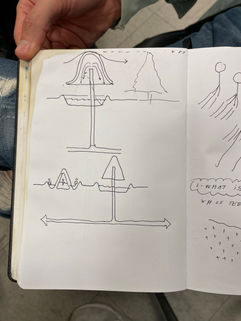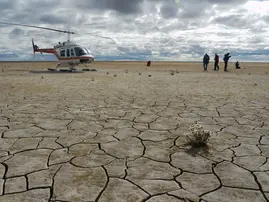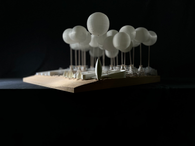
Nomad
Topia
Sector
Conceptual
Location
South Dekota, US
Year
Fall 2022
Design Team
Parker Carson
Sitong Wang
Instructor
Peter Zuroweste
TASK
We were asked to research and learn about local indigenous people of what they would do or how their architecture would react differently depending on the climate. Using this knowledge to create a design that can “dance” with the disaster.

Research
In order to start our project, we needed to understand how these climatical disasters happen and what destruction they can do to our environment. We started our research with drought, wildfire, and glacial lake outbursts. we decided to make drought our topic since drought can be unpredictable and irreversible, it also breaks open the landscape and reveals what was once hidden. We also have to research local indigenous people on our site and see what they would do to in the event of the disaster.
Indigenous Research
Throughout our research, we notice that these nomadic indigenous people would often carry their tipi structures on horseback, dragging them across the landscape. They would also travel in loops depending on the season, they would always go back to the Black Hills to collect their building supplies and get ready for the next “migration”.
Brainstorming
After our research, we began to discuss how can we integrate indigenous design into our project. We decided to take an abstract approach where these "organisms" would each have their function and create a "dance" as the disaster arrives. Some of the organisms would allow for water harvesting for our nomadic city. Some would serve as housing and structure. Some would be the transportation tools these nomads would be able to travel with housing, a large floating devices, it is our interpretation of structure on horseback with a modern touch.







Experimentation
Experimenting is critical to our project, by testing out different materials and understanding how they would perform allows us to decide whether or not it's a good approach. It also allows us to see how our design would work in real life, we would then make adjustments or need to start over. However, the most important thing is to learn and have fun!
Pinups
Our studio decided to have a unified style that we would follow, each diagram, drawing, and image would have its own pages, so it would allow us to format it as a book to publish. It was a unique experience and yes that's a lot of printing.
Animations
In order to better get our idea across to the reviewers, we made a few animations showing how our nomadic organisms would perform in different climates, as well as showing how these organisms are performing a dance with the disaster and the landscape.
Model
We were tasked to make a 36'' by 36'' model of a portion of our nomadic city and showcase how the organisms would look. We decided to CNC our topography and create our organisms by hand and both traditional and acrylic 3D printing.
Render
These renders are to showcase how the nomads can travel from place to place, how they can be lifted up can settle into the ground, and how the "organisms" can be carried and moved.















































